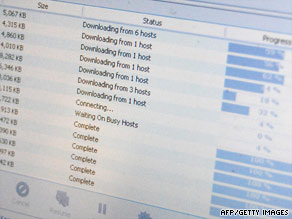
The British government has brought down its long-awaited Digital Economy Bill, and it’s perfectly useless and terrible. It consists almost entirely of penalties for people who do things that upset the entertainment industry (including the “three-strikes” rule that allows your entire family to be cut off from the net if anyone who lives in your house is accused of copyright infringement, without proof or evidence or trial), as well as a plan to beat the hell out of the video-game industry with a new, even dumber rating system (why is it acceptable for the government to declare that some forms of artwork have to be mandatorily labelled as to their suitability for kids? And why is it only some media? Why not paintings? Why not novels? Why not modern dance or ballet or opera?).
So it’s bad. £50,000 fines if someone in your house is accused of filesharing. A duty on ISPs to spy on all their customers in case they find something that would help the record or film industry sue them (ISPs who refuse to cooperate can be fined £250,000).
But that’s just for starters. The real meat is in the story we broke yesterday: Peter Mandelson, the unelected Business Secretary, would have to power to make up as many new penalties and enforcement systems as he likes. And he says he’s planning to appoint private militias financed by rightsholder groups who will have the power to kick you off the internet, spy on your use of the network, demand the removal of files or the blocking of websites, and Mandelson will have the power to invent any penalty, including jail time, for any transgression he deems you are guilty of. And of course, Mandelson’s successor in the next government would also have this power.
What isn’t in there? Anything about stimulating the actual digital economy. Nothing about ensuring that broadband is cheap, fast and neutral. Nothing about getting Britain’s poorest connected to the net. Nothing about ensuring that copyright rules get out of the way of entrepreneurship and the freedom to create new things. Nothing to ensure that schoolkids get the best tools in the world to create with, and can freely use the publicly funded media — BBC, Channel 4, BFI, Arts Council grantees — to make new media and so grow up to turn Britain into a powerhouse of tech-savvy creators.
Lobby organisation The Open Rights Group is urging people to contact their MP to oppose the plans. “This plan won’t stop copyright infringement and with a simple accusation could see you and your family disconnected from the internet – unable to engage in everyday activities like shopping and socialising,” it said.
The government will also introduce age ratings on all boxed video games aimed at children aged 12 or over.
There is, however, little detail in the bill on how the government will stimulate broadband infrastructure.
Read moreBritain’s New Internet Law: The Digital Economy Bill Is Perfectly Useless, Terrible And Loaded With Penalties



